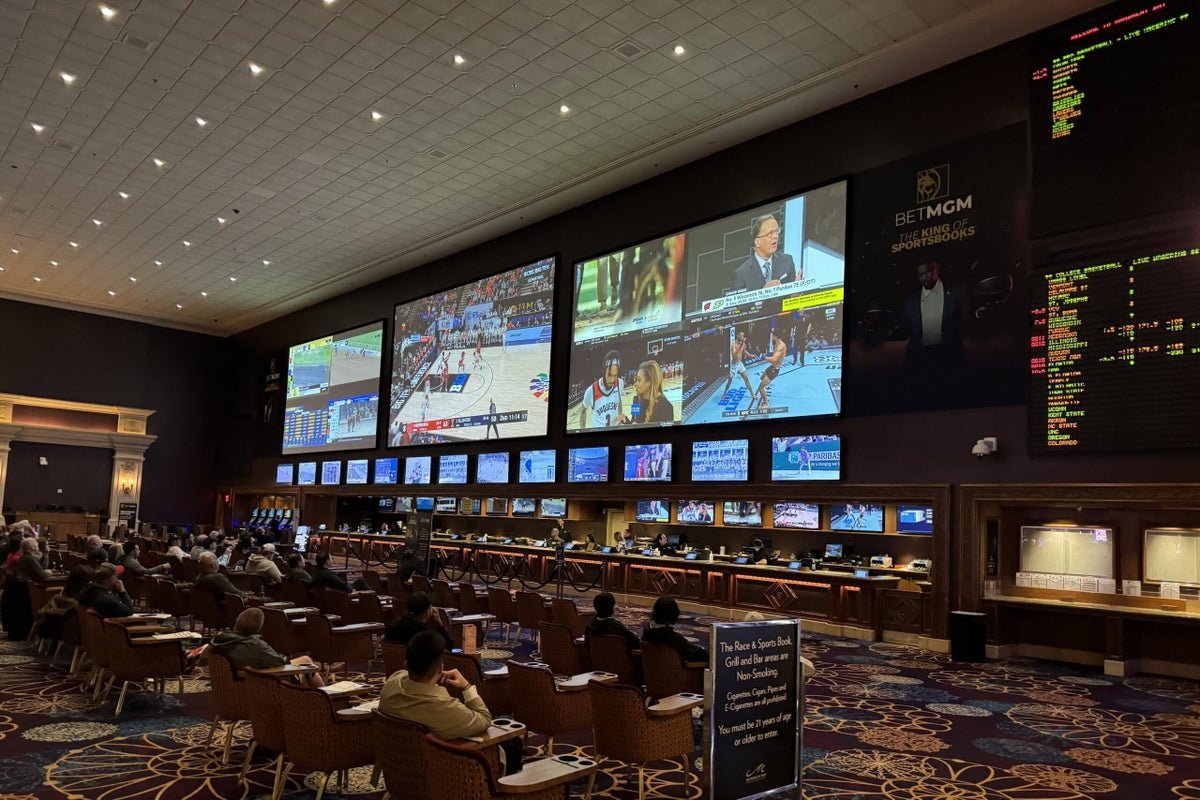Sports Betting
*Editor’s note: After this story was published, The Athletic obtained a letter from the AGA that further explains the AGA’s position on this issue. That is updated in the story below.
A small provision added to President Donald Trump’s “One Big Beautiful Bill Act” — that came to light days before the president signed the bill into law July 4 — could have a major impact on sports betting.
Advertisement
The small change could force some bettors to pay income tax even in years when they have net losses and could significantly hike the tax burden on professional sports bettors.
The provision nearly escaped notice until alarm began to spread on X just days before Trump signed the bill into law.
“Not to be hyperbolic, but it’s an extinction of professional sports betting,” a gambler who goes by the pseudonym Jack Andrews told The Athletic. Andrews is a professional gambler with a popular YouTube channel and a contributor to a MasterClass on sports and gambling. “It is the end of my career, potentially.”
One sentence of the 940-page bill says gamblers can deduct only 90 percent of their annual losses, instead of 100 percent, which has been the norm.
What does that mean? Before now, when gamblers reported their betting income, they would take their gross winnings, subtract their gross losses and then report the net amount as their taxable income. Now, they’re allowed to subtract only 90 percent of those losses, which means they appear to have more income, even though they don’t actually have that money.
That 10 percent change amounts to a whole lot if you’re dealing with huge numbers. Andrews told The Athletic that, in a year, he makes between $7 million and $10 million in gross winnings.
“If it’s $7 million as gross winnings and it’s $6.6 million as net losses, then I have a $400,000 net,” Andrews said. “But if it’s $7 million of gross wins and you can only deduct the $6.6 times 90 percent ($5.94 million), now you have $1 million that the government sees as your net income versus $400,000. I’m looking at probably a 35 percent tax rate, so about $350,000 in tax. So now I’m paying $350,000 in taxes on a $400,000 actual income. And that’s not worth it.”
Advertisement
The bill also means that even in losing years, some gamblers might still owe income tax. For example, if you win $100,000 and lose $100,000, you can deduct only $90,000 of those losses, meaning you will owe taxes on $10,000 of income even though you did not take home any money.
The biggest impact will be on people who gamble as a professional career. These professional gamblers — some of whom are known in the industry as “sharps” — record every wager, how much they win and lose, and report all of it in their taxes. Professional gamblers tend to wager large sums of money with small margins, which can lead to a significant profit over a year. (If you wager $100 million and lose $99 million, you still made a profit of $1 million.)
These gamblers aren’t just trying to win more bets; they’re trying to make money even after covering the costs of betting, including cuts from casinos and taxes.
“It’s going to be disastrous for them,” Nathan Goldman, CPA and tax professor at North Carolina State University, told The Athletic. “It’s going to devastate the Nevada economy. The professional gamblers bring a lot to that economy.”
“Gambling operates by the 80/20 rule, maybe 90/10,” Andrews said. “Ninety percent of the business comes from 10 percent of the players, the VIPs.”
And in Nevada, alarm bells are sounding. Rep. Dina Titus (D-Nev.), whose district includes Las Vegas, has already introduced a bill to reverse the change (more on that in a minute). “I think this is something that a lot of people make a livelihood off of,” Rep. Ro Khanna (D-Calif.), who co-sponsored Titus’ new bill, told The Athletic. “We know people who are working at the unions or the casinos and in these industries whose livelihood will be affected.”
Advertisement
This week, many are looking at the IRS’ definition of a gambling “session,” which typically means you can report your net winnings or losses from a whole night on a casino floor, rather than reporting every game you played while inside the casino. But with sports betting, every bet is one session.
If bettors can stretch that interpretation to say, a day, a week, etc., they could have more control over how they report their taxable income. “I think you’re going to see three types of people,” Zak Zimbile, CPA, told The Athletic. “Those who continue to gamble and report incorrectly, those who continue to do it and adjust their definition of what a session is, and those who might completely stop altogether, which might be your high-volume, low-margin people.”
Amateur sports bettors — people who make casual bets on sports betting apps such as BetMGM or FanDuel — might not feel the effects. (The Athletic has a partnership with BetMGM.)
At least not unless they get audited.
“A lot of people don’t even understand that they owe taxes on gambling,” Goldman said. “But if a bettor gets audited and the IRS reviews their sportsbook account balance, they could say, ‘Wait a minute, you bet $100,000 throughout the year, you won $50,000 and lost $50,000, you actually have taxable income of $5,000.’”
The deduction rule came from the Senate Finance Committee, chaired by Sen. Mike Crapo (R-Idaho). After the bill was approved by the House on May 22, the Senate Finance Committee introduced revisions on June 16. The final version of the legislative text was released by the Senate on June 27 and passed by the Senate on July 1. The bill was then rushed back to the House to meet Trump’s timeline, passed in the House on July 3 and was signed into law by Trump on July 4.
Many in the gambling world woke up July 1 to news of the change, and it took days to become widespread.
Advertisement
Speculation online about the reasons for the provision has run wild, ranging from straightforward accounting explanations to conspiracy theories that sportsbooks were behind the change in an attempt to eliminate sharp bettors or that the provision benefits new prediction market firms such as Kalshi, which are seen as rising competitors to sportsbooks.
“You can deduct your full losses under this bill if you’re one of these predictive sites because those aren’t technically online betting sites,” Khanna told The Athletic. Prediction markets are not regulated and operate differently from sportsbooks but allow users to put money on future outcomes, similar to traditional betting. “I just think that they were looking for revenue. Who’s going to be for standing up for betting?”
“It’s very popular to tax gamblers,” Goldman said.
The Joint Committee on Taxation estimated that the gambling tax provision would generate over $1.1 billion in additional revenue over eight years, although some question this estimate. “You’re going to have a lot of professional gamblers stop being professional gamblers,” Goldman said. “It’s only $1.1 billion if everyone continues doing the exact same thing as before.”
Politicians are scrambling to determine whether they can reverse this change.
Monday, Titus introduced the FAIR BET Act, which seeks to restore the 100 percent deduction rate. Titus says there is bipartisan support, but it’s too soon to know whether it will truly gain traction.
FAIR BET Act by @RepDinaTitus is out. Language gets right to the point.
First reported by InGame. https://t.co/E6uIpcBTg8 pic.twitter.com/HzBI0d5Wy5
— Fairplaygov (@fairplaygov) July 8, 2025
Titus argues this bill is a threat to legal betting and will drive professional gamblers to unregulated, illegal markets. “We should be encouraging players to properly report their winnings and wager using legal operators,” she said in a statement. “The Senate change will only push people to not report their winnings and to use unregulated platforms.”
Advertisement
“If (VIP bettors) realize this creates a glass ceiling above them, they won’t want to gamble anywhere it would show up on their taxes,” Andrews said. “All gambling income is taxable, no matter where or how it’s done, but regulated gambling definitely is more likely to create a paper trail than offshore or underground gambling.”
The American Gaming Association, which lobbies for casino and sportsbook operators, initially applauded the “One Big Beautiful Bill Act” in a post that drew ire from gamblers online. The organization has since thrown its support behind Titus’ legislation. “We are committed to working with Congresswoman Titus, other congressional leaders, and the Trump Administration to restore the long-standing tax treatment of gaming losses,” an AGA representative told The Athletic.
When asked whether the AGA raised concerns about the provision, a representative from Crapo’s office told The Athletic, “The legislative text was released very widely and publicly June 16 via press release, posted on the website, reported on, etc. The American Gaming Association raised concerns with Sec. 899 of the bill. Not the 90 percent threshold.”
“If they didn’t know of the tax change language between June 16, when it was published by the Senate Finance Committee, and when it hit social media around July 1, that’s pretty damning,” Andrews said.
A letter obtained by The Athletic after publication of the original version of this story shows that the AGA sent a list of tax priorities to Sen. Crapo and other members of Congress on May 6, before the bill was first introduced in the House. The deduction of gaming losses is included in the top three priorities in that May 6 letter.
(Photo: Kirby Lee / USA Today)
Hannah Vanbiber is a staff editor for sports betting at The Athletic. Hannah previously wrote for Gaming Today, New York Sports Day, Rocky Top Insider, MLIVE, and other sports betting outlets as a freelance writer. She started her journalism career in Chattanooga, Tennessee, as a reporter and editor covering local sports. Follow Hannah on Twitter @HannahVanbiber
How small provision added to Donald Trump’s ‘Big Beautiful Bill’ affects taxes for sports bettors – The Athletic – The New York Times



